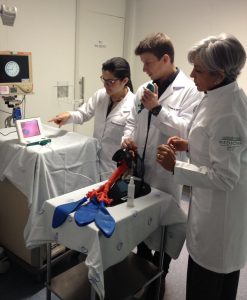Oscar Wilde wrote that “experience is the name that everyone gives to their mistakes” (Lady Windemere’s Fan, Act III, 1892). Just as we are not expected to become champion tennis players without hours of physical training, coaching, and careful attention to our head game, doctors should not be expected to become competent bronchoscopists simply by taking the scope in hand at the patient’s bedside. As in sports, learning requires the acquisition of skills and facts, but also an understanding of how we feel about what we are doing. Professional athletes have recourse to a team psychologist. Doctors are presumed to converse with colleagues or other health care professionals.
When I ask bronchoscopists from around the world whether they practice their response to procedure-related complications such as massive bleeding, seizures, cardiopulmonary arrest, or pneumothorax, in a simulated setting, the answer is almost always no. Nor do they discuss how they feel after the occurrence of such complications. I think this is because doctors have learned by doing for too long, and only recently is there a move toward coaching using models, simulation, and debriefing sessions.
Organized efforts are still necessary, however, before new generations of physicians adopt this as the norm. The same can be said about addressing a doctor’s emotional responses to complications. Most surgery departments have morbidity and mortality conferences to discuss problem cases, but such practices are not routine within the interventional pulmonary community. Even when discussions occur, there is little support for physicians struggling with their feelings.
While it is relatively straightforward to convince an enthusiastic trainee that practicing on a model will accelerate growth along the learning curve, it is less obvious to persuade doctors that talking about their feelings (which addresses their affective and experiential knowledge) can help prevent complications and improve patient care, as well as reinforce positive attitudes toward medical practice.
An educational program that includes simulation-based instruction and open discussions about feelings, therefore, requires a paradigmatic shift where leaders think outside the box monopolized by “see one, do one, teach one” behaviors in order to embrace practices guided instead by a “First, do no harm” philosophy.

Master Instructor Viviana F. implements simulation-based bronchoscopy training in Brazil
